实用英语词汇学讲座1
- 格式:doc
- 大小:59.00 KB
- 文档页数:67
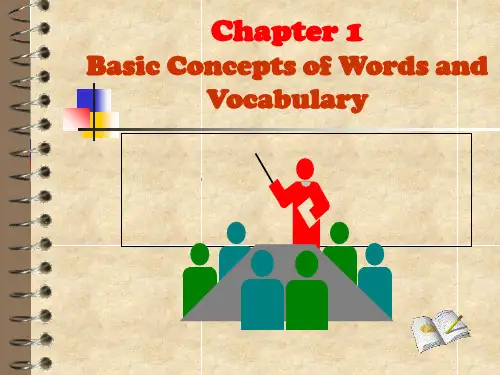
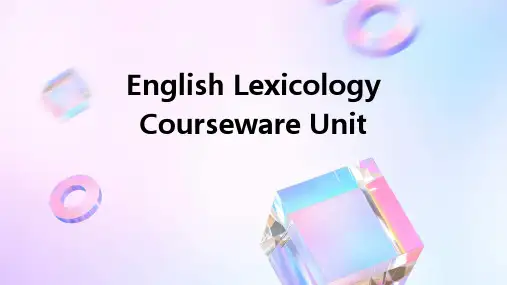
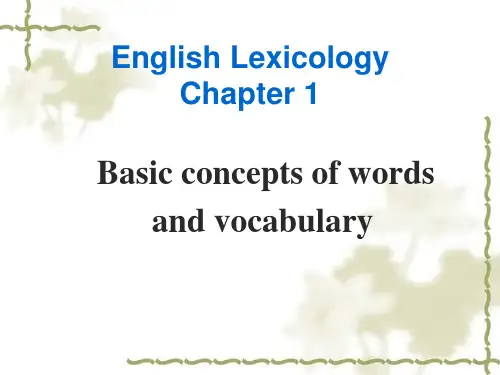
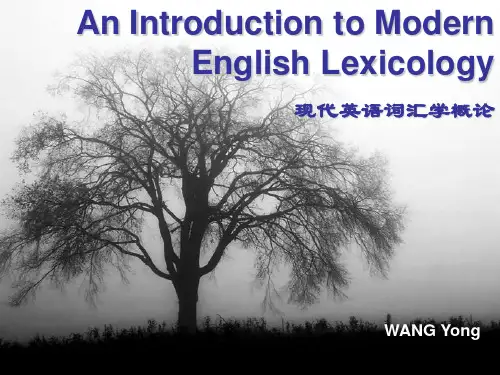
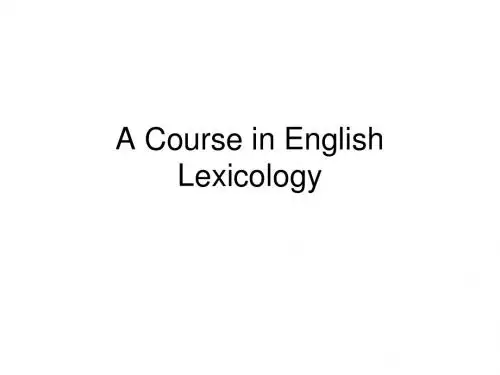
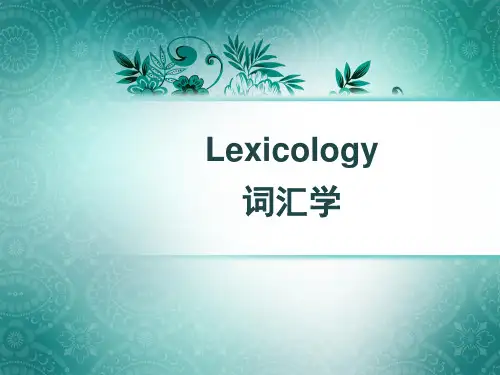
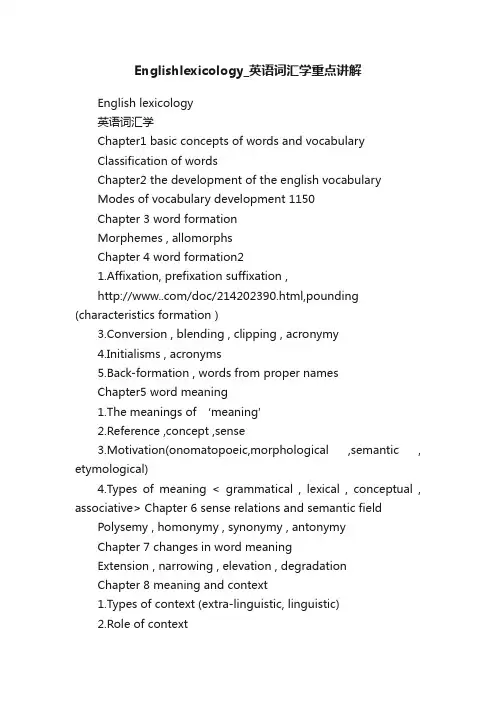
Englishlexicology_英语词汇学重点讲解English lexicology英语词汇学Chapter1 basic concepts of words and vocabularyClassification of wordsChapter2 the development of the english vocabularyModes of vocabulary development 1150Chapter 3 word formationMorphemes , allomorphsChapter 4 word formation21.Affixation, prefixation suffixation ,/doc/214202390.html,pounding (characteristics formation )3.Conversion , blending , clipping , acronymy4.Initialisms , acronyms5.Back-formation , words from proper namesChapter5 word meaning1.The meanings of ‘meaning’2.Reference ,concept ,sense3.Motivation(onomatopoeic,morphological ,semantic , etymological)4.Types of meaning < grammatical , lexical , conceptual , associative> Chapter 6 sense relations and semantic field Polysemy , homonymy , synonymy , antonymyChapter 7 changes in word meaningExtension , narrowing , elevation , degradationChapter 8 meaning and context1.Types of context (extra-linguistic, linguistic)2.Role of contexta.elimination of ambiguityb.indication of referencec.Provision of clues for inferring word-meaningChapter9 english idioms1.Classification of idioms(nominal , adjectival , verbal , adverbial )2.sentence and useChapter 10 english DictionariesTypes of dictionary , three good Dictionarya.Longman dictionary of contemporaryb.Collins COBUILD english Dictionaryc. A Chinese-english DictionaryUnit 1Methods of study ,there are generally two approaches to the study of words ,namely synchronic and diachronicAims and significance of the courseLanguage study involves the study of speech sounds ,grammar and vocabulary .vocabulary has proved particularly important and certainly the most difficult .Willkins asserts ‘without grammar very little can beconveyed ,without vocabulary nothing can be conveyed’ A good knowledge of morphological structure of english words and rules of word-formation will help learners develope their personal vocabulary and consciously increase their word power.V ocabularyAll the words in a language make up its vocabulary .The term vocabulary is used in different senses1.It can refers to the total number of the words in a language2.It can stands for all the words used in a particular historical period3.Also used to all the words of a given dialectClassification of wordsWords may fall into the basic word stock and nonbasic vocabulary by use frequency ,into content words and function words by notion ,and into native words and borrowed words by originBasic word stock have characteristics1.All national character2.Stability3.Productivity4.Polysemy5.Collocability6 Neutral in style7 Frequent in useWords void (lack)of the stated characters ,do not belong to the common core of the language ,they include the following: Terminology 术语,专有名词JargonSlang 俚语,黑话ArgotDialectal wordsArchaismsNeologismsContent words(=notional words) and function words (=empty words) Native words and borrowed wordsApart from the characteristics mentioned of the basic word stock ,in contrast to borrowed words ,native words have two other features Neutral in styleFrequent in useBorrowing words :words taken over from foreign languagesare known as borrowed words and loan words or borrowings in simple terms Loan words under four classesDenizens 同化词Aliens 异化词Translation-loans 译借词Semantic-loans 借意词The Indo-European language familyWhich can be grouped into roughly 300 language families on the basis of similarities in their basic word stock and grammar ,theIndo-Europe is one of them .it is thought to be a highly inflected language They accordingly fall into eight principle groups ,which can be grouped into an Eastern set : Balto-slavic, Indo-Iranian, American and Albanian; a Western set; Celtic , Italic, Hellenic,GermanicA historical overview of the english vocabularyThe first people known to inhabit the land were CeltsThe second major language known in England was the Latin of the Roman Legions450- < old > -1150-(Middle)-1500- -NOWModes of vocabulary developmentWe can concluded that modern english vocabulary develops through three channels < > creation , semantic change , borrowing Creation refers to the formation of new words by using the existing materials namely roots ,affixes and other elementsSemantic change means an old form which takes on a new meaning to meet the new needBorrowing has palyed a vital role in the development ofvocabulary ,particularly in earlier timesMorphemes :minimal meaningful units are known as morphemes,in other words ,th e morphemes is ‘the smallest functioning unit in the composition of words ’Chapter 5Word meaningWords are but symbols , many of which have meaning only when they have acquired reference .1.reference is the relationship between language and the word .The reference a word to a thing outside the language is arbitrary <随意的>and conventional <传统的>2.Concept<概念>=notionIn many cases meaning is used in the sense of ‘concept ’meaning and concept are closely connected but not identical3.Sense :generally speaking ,the meaning of ‘meaning’is perhaps what is termed ‘sense’ . ‘sense’denotes the relationships inside the language.Motivation <理据>Motivation accounts for the connection between the linguistic symbol and its meaningOnomatopoeic motivation 拟声的理据Morphological motivation 形态的理据Semantic motivation 语义<联想>的理据Semantic motivation refers to the mental associations suggested by the conceptual meaning of a wordEtymological motivation 词源的理据The meaning if many words often related directly to their origins, Types of meaninga.Grammatical meaning an Lexical meaning语法和词汇意义b.Conceptual meaning and associative meaning 概念和联想意义Chapter 6The subjects that have long held the interest and attention ofsemanticists are ,polysemy 多义的, homonymy , synonymy , antonymy , and hyponymyTwo approaches to polysemyDiachronic approach and synchronic approachThe meanings were acquired by extension ,narrowing ,analogy ,transfer The development of word-meaning from monosemy to polysemy follows two courses,traditionally known as radiation and concatenation HomonymyBased on the degree of similarity ,homonyms fall into three classes:perfect homonyms ,homographs and homophones1.Perfect homonyms are words identical both in sound and spelling but different meaning .Bank n. The edge of the river ,lakeBank n . An establishment for money businessBear n. A large heavy animalBear v. To put up withDate n. A kind of fruitDate n. A boy or a girl friend2.Homographs are words identical only in spelling but different in sound and meaningBow n. Bending the head as a greetingBow n. The device used for shooting arrowsSow v. To scatter seedsSow n. Female adult pig3.Homophones are words identical only in sound butdifferent in spelling and meaningDear n. A loved personDeer n.a kind of animalRight a. correctWrite v.to put down on paper with a penRite n. Ceremonial procedureSon n. A male child of someoneSun n. The heavenly body from which the earth gets warmth and light Of three types ,homophones constitute the largest number and are most commonOrigins of homonymsChange in sound and spellingBorrowingShortingAs homonyms are identical in sound or spelling ,particularly homophones, they are often employed to create puns<双关>for desired effect of ,say, humor,sarcasm or ridicule<嘲弄> On Sunday they pray for you and on Monday they prey <折磨>on you So-called pious<虔诚的>gentleman and ladies 善男信女The sardonic tone is unmistakable 讽刺的语气是不言而喻的SynonymySynonymy is one of the characteristic features of vocabulary of natural languagesTypes of synonyms1. Absolute synonyms also known as complete synonyms are words which are identical in meaning in all its aspects,both in grammatical meaning and lexical meaning ,including conceptual and associative meanings2. Relative synonymy also called near-synonyms are similaror nearly the same in denotation,but embrace different shades of meaning or different degrees of given quality.For example .to change a thing is to put another thing in its place ;to altera thing is to alter it in different manner and at different times .’A man change his habits ,alters his conduct ,and varies his manner of speaking’Look at stagger /reel/totter.stagger implies unsteady movement characters by a loss of balance and failure to maintain a fixed course . Stagger under a heavy load ;reel suggests a swaying or lurching so as to appear on the verge of falling .Silent沉默的,无言的,寂静的/ tacit , shine闪耀,发光/ glitter 华丽夺目,炫耀/sparkle闪耀,活跃,焕发活力和才智/glare强光,瞪眼,炫耀, different/ various, idle空闲的,懒惰的,无意义的/lazy/indolent , strange奇怪的/odd 古怪的/ queer,古怪的,可疑的large / huge庞大的/tremendous极大的,巨大的,惊人的,极好的/colossal Sources of synonyms1.BorrowingAs a result of the borrowing ,words of native origin form many couplets and triplets with those from other language2.Dialects and regional english3.Figurative an euphemistic4.Coincidence with idiomatic expressionsDiscrimination of synonymsThe differences between synonyms boil down to three areas: denotation , connotation ,and application1.Difference in denotation .‘I did not comprehend his arguments ,although i understood the language , and all the sentences’A lump of sugar一块糖, a slice of meat一片肉, a chunk ofwood , a sheet of paper A cake of soapTypes of antonyms1.Contradictory termsThe assertion of one is the denial of the otherAnother distinctive feature of this category <类型>is that such antonyms are non-gradable2.Contrary terms3.Relative termsHolds water <站得住脚的>Characters of antonyms1.Antonyms are classified on the basis of semantic opposition.words denoting nature, quality or state of things have many antonyms2.A word which has more than one meaning can have more than one antonym3.Antonyms differ in semantic inclusion .pairs of antonyms are seen as marked and unmarked terms respectively4.Contrary terms are gradable antonymsDestitute / opulent dull / livelyHyponymyHyponymy deals with the relationship of semantic inclusion.That is the meaning of more specific word word is included in that of another more general word .For instance ,tulip and rose are hyponyms of flowerSuperordinate termsHammer , saw , screwdriver ,spanner, plaice, cod , herring ,sole Semantic field <领域>The massive word store of a language like english an be conceived of as composed around a number of meaning areas.An integrated system of lexemes interrelated in sense 语义相互关联It is general belief that.....Personal address system 个人称呼KinshipTypes of changesWord-meaning changes by modes ofExtension< 扩展>,narrowing<缩小> ,degradation< 降格>,elevation< 升格>,and transferCauses of changes: it is in response to some needExtra-linguistic factors1.Historical reason2.Class reason3.Psychological 心理学的,精神上的reasonThe role of context <语境>1.Elimination of ambiguity <消除歧义>2.Indication of referents <限定所指>3.Provision of clues for inferring word -meaning <为猜测词义提供线索>①Definition②Explanation③Example④S ynonymy⑤Antonymy⑥Hyponymy⑦Relevant details⑧Word structureChapter 9Idioms consists of set phrases and short sentences ,which are peculiar to the language in question and loaded with the native cultures and ideas .therefore, idioms are colorful ,forcible andthought-provoking.For example ,fly off the handle (become excessively angry) and put up with ( tolerate)In a board sense ,idioms may included colloquialisms ,slang experience, proverbs .Character of Idioms1.Semantic unityBeing phases or sentences ,idioms each consist of more than one word ,but each is a semantic unity. Idiom have their respective literal meanings .for instance, till the cows come home Keep in mind take offto no avail like a breeze2.Structural stability 结构稳定First the constituents of idioms cannot be replacedLip service <support only="" in="" words="" ,not="" fact="" bdsfid="283"> is not to be changed into mouth service . Kick the bucket bury the hatchet。
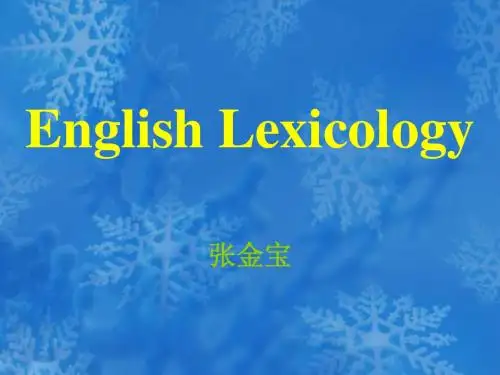
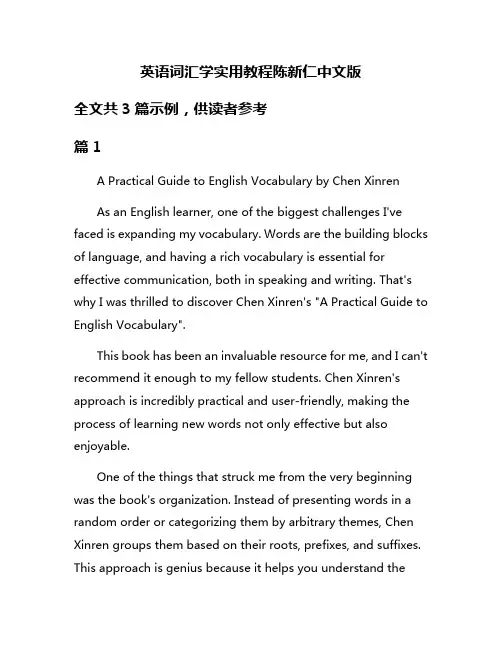
英语词汇学实用教程陈新仁中文版全文共3篇示例,供读者参考篇1A Practical Guide to English Vocabulary by Chen XinrenAs an English learner, one of the biggest challenges I've faced is expanding my vocabulary. Words are the building blocks of language, and having a rich vocabulary is essential for effective communication, both in speaking and writing. That's why I was thrilled to discover Chen Xinren's "A Practical Guide to English Vocabulary".This book has been an invaluable resource for me, and I can't recommend it enough to my fellow students. Chen Xinren's approach is incredibly practical and user-friendly, making the process of learning new words not only effective but also enjoyable.One of the things that struck me from the very beginning was the book's organization. Instead of presenting words in a random order or categorizing them by arbitrary themes, Chen Xinren groups them based on their roots, prefixes, and suffixes. This approach is genius because it helps you understand theunderlying patterns and logic behind word formation, enabling you to grasp and retain new vocabulary more effectively.The book is divided into several chapters, each focusing on a specific aspect of vocabulary building. The first chapter introduces the concept of word roots, explaining how many English words are derived from Greek and Latin roots. Chen Xinren provides a comprehensive list of common roots, along with their meanings and examples of words that incorporate them. This chapter alone has been a game-changer for me, as it has empowered me to decipher the meanings of unfamiliar words by breaking them down into their constituent parts.The next chapter delves into prefixes and suffixes, those little word parts that can significantly alter a word's meaning. Chen Xinren meticulously explains the nuances of each prefix and suffix, illustrating their usage with clear examples. I found this section particularly helpful for expanding my vocabulary in specific contexts, such as academic writing or professional settings.But Chen Xinren's approach goes beyond mere memorization. Throughout the book, he emphasizes the importance of actively using new words in context, whether through writing exercises, speaking practice, or even creatingflashcards. This hands-on approach has been instrumental in solidifying my understanding of the vocabulary and ensuring that the words become a permanent part of my lexicon.One of the most refreshing aspects of "A Practical Guide to English Vocabulary" is its emphasis on real-world applications. Chen Xinren doesn't just present words in isolation; instead, he incorporates them into authentic contexts, such as conversations, news articles, and literary excerpts. This approach has been incredibly valuable for me, as it has helped me understand how words are used in natural, everyday situations, enhancing my comprehension and fluency.Additionally, the book includes a wealth of practice exercises and quizzes, allowing me to test my knowledge and reinforce what I've learned. These exercises range from simplefill-in-the-blank questions to more complex tasks that require me to analyze and synthesize information. I particularly appreciate the answer keys provided, as they enable me toself-assess and identify areas that need further attention.One aspect that sets "A Practical Guide to English Vocabulary" apart is its cultural insights. Chen Xinren recognizes that language is deeply intertwined with culture, and he skillfully weaves in cultural references and idioms throughout the book.This added dimension has not only enriched my vocabulary but has also deepened my understanding of the English-speaking world, fostering a greater appreciation for the nuances and nuances of the language.Furthermore, the book is incredibly user-friendly and visually appealing. The layout is clean and organized, with clear headings and subheadings that make it easy to navigate. The inclusion of illustrations, diagrams, and mnemonic devices further enhances the learning experience, catering to different learning styles and making the material more engaging and memorable.In conclusion, Chen Xinren's "A Practical Guide to English Vocabulary" has been an invaluable companion on my journey to mastering English vocabulary. Its systematic approach,real-world applications, and engaging exercises have transformed the way I learn and retain new words. Whether you're a student preparing for exams, a professional seeking to enhance your communication skills, or simply someone with a passion for language learning, this book is an essential resource that will undoubtedly enrich your vocabulary and deepen your understanding of the English language.篇2A Practical Guide to Mastering English Vocabulary by Chen XinrenAs students, one of the biggest challenges we face when learning English is expanding our vocabulary. We spend countless hours memorizing word lists and definitions, only to forget them a few days later. However, effective vocabulary learning doesn't have to be a tedious and frustrating process. In this guide, I'll share practical strategies that have helped me build a solid English vocabulary foundation.Embrace ContextOne of the most powerful ways to learn new words is through context. When you encounter an unfamiliar word while reading or listening, pay attention to the surrounding sentences and try to infer its meaning. This not only helps you understand the word in context but also aids in remembering it better. Additionally, keep a vocabulary notebook and jot down new words along with their context and your guessed meaning. Later, you can check the actual definition and reinforce your understanding.Utilize Word Roots, Prefixes, and SuffixesMany English words share common roots, prefixes, and suffixes, which can provide valuable clues about their meanings. For instance, the prefix "re-" often indicates repetition or going back (e.g., "redo," "rewrite"), while the suffix "-able" denotes capability or possibility (e.g., "readable," "avoidable"). By familiarizing yourself with these word parts, you can develop a better understanding of new words and expand your vocabulary more efficiently.Immerse Yourself in EnglishSurrounding yourself with English media and materials is a fantastic way to reinforce your vocabulary learning. Read books, magazines, or online articles that interest you, listen to podcasts or watch movies and TV shows in English. Whenever you come across unfamiliar words, make a note of them and look them up later. Immersion not only exposes you to new vocabulary but also helps you understand words in context and observe their usage patterns.Use Vocabulary Apps and Online ResourcesIn today's digital age, there are numerousvocabulary-building apps and online resources available. Apps like Anki, Quizlet, and Wordly offer interactive flashcards, games, and quizzes to help you memorize and review new words.Additionally, websites like and FreeRice provide engaging exercises and explanations to expand your word knowledge. These tools can make vocabulary learning more enjoyable and effective.Practice, Practice, PracticeThe key to solidifying your vocabulary knowledge is practice. Make an effort to use the new words you've learned in your writing and conversations. Start a vocabulary journal and write sentences or short paragraphs using the new words. Participate in language exchange platforms or join English conversation clubs to practice using your new vocabulary in real-life situations. The more you actively use the words, the better they'll stick in your memory.Learn Through Stories and MnemonicsStories and mnemonics can be powerful tools for remembering new words. Create vivid stories or mental images that associate the word's meaning with something memorable. For example, to remember the word "euphoria," you could imagine a cheerful elephant (eu-phoria) dancing with joy. Alternatively, use mnemonics, which are short phrases or sentences that incorporate the word or its definition. The morecreative and personal these techniques are, the more effective they'll be for you.Embrace Mistakes and Celebrate ProgressLearning a new language is a journey, and making mistakes along the way is inevitable. Don't be discouraged by stumbling over unfamiliar words or forgetting ones you've learned. Embrace these mistakes as opportunities to improve and reinforce your understanding. Celebrate your progress, no matter how small, and acknowledge the effort you're putting into expanding your vocabulary.Remember, building a strong English vocabulary takes time and consistent effort. But by incorporating these practical strategies into your learning routine, you'll gradually develop a rich and diverse vocabulary that will enhance your communication skills and open up new opportunities for personal and professional growth.Happy learning, and may your vocabulary journey be rewarding and enjoyable!篇3English Vocabulary: A Practical Guide by Chen Xinren (Chinese Edition)What's up, fellas? Tired of feeling like a kindergartner when it comes to your English vocab? Yeah, me too. That's why I'm here to give you the real deal on building a killer vocab that'll make you sound like a total boss.First things first, let's get real about why vocabulary matters. Sure, you can get by with the basics, but if you want to level up your English game, you need to expand that word bank. A rich vocabulary doesn't just make you sound smarter (although, let's be honest, that's a major perk). It also helps you express yourself more precisely and communicate your ideas more effectively.But where do you even start? With so many words out there, it can feel overwhelming. That's where this guide comes in. I'm going to break it down for you, sharing practical tips and strategies that have worked for me and my friends.Tip #1: Read, Read, ReadThis one's a no-brainer, but it's also the most powerful tool in your vocabulary-building arsenal. Reading exposes you to new words in context, which makes them easier to understand and remember. Don't just stick to textbooks and boring stuff, though. Read novels, magazines, blogs – anything that interests you. The more you enjoy the material, the more likely you are to stick with it.Tip #2: Use Context CluesWhen you come across an unfamiliar word, don't immediately reach for the dictionary. Try to figure out its meaning from the surrounding words and phrases. This not only helps you learn the new word, but it also trains your brain to become a better context detective.Tip #3: Keep a Vocab JournalAs you encounter new words, write them down in a dedicated journal or notebook. Include the definition, the context in which you found the word, and even a sample sentence or two. Regularly reviewing your journal will help reinforce these new additions to your vocabulary.Tip #4: Play Word GamesWho says learning has to be boring? There are tons of fun word games out there that can help expand your vocabulary while keeping your brain engaged. Try apps like Wordle, Spelling Bee, or even good old-fashioned crossword puzzles.Tip #5: Use Flashcards (But Make Them Fun)Flashcards might seem old-school, but they're still an effective way to memorize new words. But instead of boring, plain-text cards, get creative! Draw silly pictures, createmnemonics, or even record yourself saying the word and its definition. The more sensory associations you create, the better you'll remember.Tip #6: Learn Word Roots, Prefixes, and SuffixesUnderstanding the building blocks of words can help you decipher unfamiliar terms and remember their meanings more easily. For example, if you know that the prefix "bi-" means two, and the root "ped" means foot, you can figure out that "biped" refers to a two-footed creature.Tip #7: Use New Words in ConversationOnce you've learned a new word, use it! Actively incorporating new vocabulary into your daily conversations and writing will help solidify it in your memory and make it a natural part of your language.Tip #8: Subscribe to a "Word of the Day" ServiceThere are plenty of free online services that will send you a new word and its definition every day. Adding one new word to your vocabulary each day might not seem like much, but over time, those daily additions will really add up.Tip #9: Watch English Movies and TV ShowsImmersing yourself in English-language media is not only entertaining, but it also exposes you to a wide range of vocabulary in a natural, conversational context. Pay attention to the words and phrases used, and look up any unfamiliar ones.Tip #10: Don't Be Afraid to Make MistakesLearning a new language is all about trial and error. Don't be afraid to use unfamiliar words in your speech or writing, even if you're not 100% sure about their meaning or usage. Making mistakes is part of the process, and it's often the best way to reinforce what you've learned.Bonus Tip: Have Fun with It!Learning new vocabulary doesn't have to be a chore. Approach it with a sense of curiosity and playfulness, and you'll be surprised at how quickly your word bank grows. Celebrate your progress, no matter how small, and enjoy the journey of becoming a more articulate and confident English speaker.Remember, building a solid vocabulary is a marathon, not a sprint. Stick with it, and before you know it, you'll be dropping linguistic bombs left and right. Who knows, you might even become the next Shakespeare (or at least the next Cardi B)!。
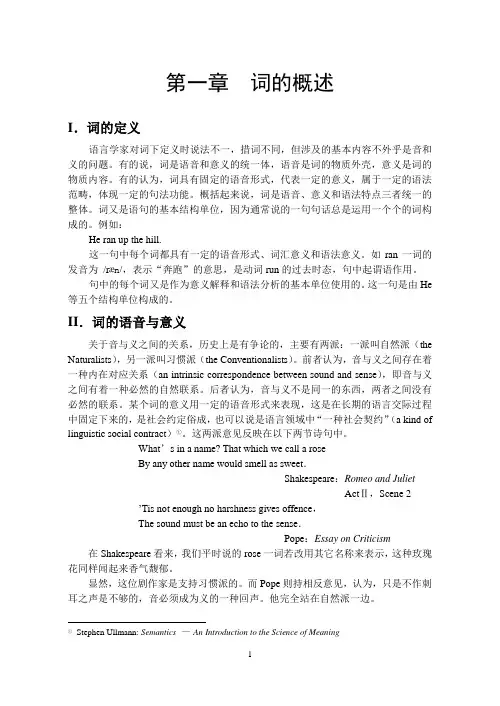
第一章词的概述I.词的定义语言学家对词下定义时说法不一,措词不同,但涉及的基本内容不外乎是音和义的问题。
有的说,词是语音和意义的统一体,语音是词的物质外壳,意义是词的物质内容。
有的认为,词具有固定的语音形式,代表一定的意义,属于一定的语法范畴,体现一定的句法功能。
概括起来说,词是语音、意义和语法特点三者统一的整体。
词又是语句的基本结构单位,因为通常说的一句句话总是运用一个个的词构成的。
例如:He ran up the hill.这一句中每个词都具有一定的语音形式、词汇意义和语法意义。
如ran一词的发音为/ræn/,表示“奔跑”的意思,是动词run的过去时态,句中起谓语作用。
句中的每个词又是作为意义解释和语法分析的基本单位使用的。
这一句是由He 等五个结构单位构成的。
II.词的语音与意义关于音与义之间的关系,历史上是有争论的,主要有两派:一派叫自然派(the Naturalists),另一派叫习惯派(the Conventionalists)。
前者认为,音与义之间存在着一种内在对应关系(an intrinsic correspondence between sound and sense),即音与义之间有着一种必然的自然联系。
后者认为,音与义不是同一的东西,两者之间没有必然的联系。
某个词的意义用一定的语音形式来表现,这是在长期的语言交际过程中固定下来的,是社会约定俗成,也可以说是语言领域中“一种社会契约”(a kind of linguistic social contract)①。
这两派意见反映在以下两节诗句中。
What’s in a name? That which we call a roseBy any other name would smell as sweet.Shakespeare:Romeo and JulietActⅡ,Scene 2 ’Tis not enough no harshness gives offence,The sound must be an echo to the sense.Pope:Essay on Criticism 在Shakespeare看来,我们平时说的rose一词若改用其它名称来表示,这种玫瑰花同样闻起来香气馥郁。
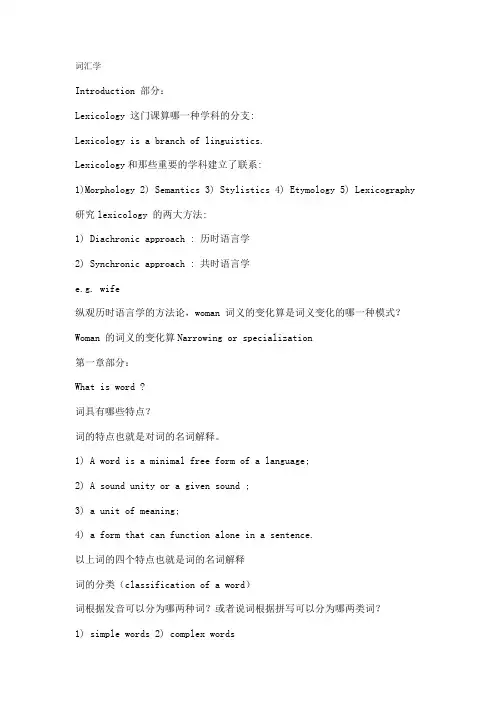
词汇学Introduction 部分:Lexicology 这门课算哪一种学科的分支:Lexicology is a branch of linguistics.Lexicology和那些重要的学科建立了联系:1)Morphology 2) Semantics 3) Stylistics 4) Etymology 5) Lexicography 研究lexicology 的两大方法:1) Diachronic approach : 历时语言学2) Synchronic approach : 共时语言学e.g. wife纵观历时语言学的方法论,woman 词义的变化算是词义变化的哪一种模式?Woman 的词义的变化算Narrowing or specialization第一章部分:What is word ?词具有哪些特点?词的特点也就是对词的名词解释。
1) A word is a minimal free form of a language;2) A sound unity or a given sound ;3) a unit of meaning;4) a form that can function alone in a sentence.以上词的四个特点也就是词的名词解释词的分类(classification of a word)词根据发音可以分为哪两种词?或者说词根据拼写可以分为哪两类词?1) simple words 2) complex words单音节词例子:e.g. Man and fine are simple多音节词例子:e.g. Management, misfortune, blackmailmanagement 可以次划分为manage 和 -mentmisfortune 可以次划分为mis- 和 fortuneblackmail 次划分为black 和 mailWhat is the relationship between sound and meaning?1)There is ‘no logical relationship between the sound and actual thing.e.g. dog. cat2)The relationship between them is conventional.3) In different languages the same concept can be represented by different sounds.What is relationship between sound and form?1)The written form of a natural language is the written record ofthe oral form. Naturally the written form should agree with the oral form, such as English language.2)This is fairly true of English in its earliest stage i.e. Old English3)With the development of the language, more and more differences occur between the two.What are the great changes that causes illogical relationship or irregularity between sound and form?1) The internal reason for this is that the English alphabet was adopted from the Romans, which does not have a separate letter torepresent each sound in the language so that some letters must do double duty or work together in combination.2) Another reason is that the pronunciation has changed more rapidly than spelling over the years, and in some cases the two have drawn far apart.3) A third reason is that some of the differences were created by the early scribes.4) Finally comes the borrowing, which is an important channel of enriching the English vocabulary.要记住以上四句话中的关键词:1) influenced by Romans2) Pronunciation changed3) early scribes4) borrowing你能不能举出外来语对英语发音,拼写造成不一致的例子有哪些?e.g. stimulus (L) ,fiesta (Sp) ,eureka (Gr), kimono (Jap)外来语对英语造成的最大的影响就是‘sound and form ’不一致。
Chapter 1 Basic Concepts of Words and Vocabulary 1. The definition of a word: A word is a minimal free form of language which has a given sound and meaning and syntactic function. 2. Sound and Meaning There is no logical or intrisinc connection between a sound and what it refers to. The relation between sound and meaning is almost always arbitrary or conventional. The same language can use the same sound to mean different things and the different languages use different sounds to refer to the same thing. 3. Sound and Form The written form of English is not an acurate representation of the spoken form.There are different causes of the differences between sounds and forms in the English language. 1)The English alphabet was adopted from the Romans, which does not employ the system of one single letter to stand for one sound. 2)The early scribes deliberately changed spelling of words to make a line even or for easier recogniton. 3) Dictionaries help to fix the spelling of words 4) English has borrowed many words from other languages, which may not have been assimilated . 4. Vocabulary All the words in a language are termed as vocabulary. However, vocabulary can also be used to refer to all the words in a book, or in a particular historical period of time, or in a dialet, or in a particular discipline, or even to all the words that a person possesses. 5. Classification of Words Words can be classified into the basic word stock and nonbasic word stock by use frequence, into content words and functional words by notion and into native words and borrowed words by origin. 1)The Characteristics of the Basic Word Stock (1) All national character (2)stability (3)productivity (4)polysemy (5)collocability 2)The Characteristics of borrowed words (1)Denizens: the early borrowed words which have been assimilated and conformed to the English way of pronounciation and spelling. (2)Aliens: the borrowed words which have retained the foreign way of pronounciation or spelling and have not been assimilated into the English language. (3)Translation-loans: the words and expressions which are formed from the existing English materials, but modelled on the patterns of another language. (4)Semantic loans: Words which have not been borrowed with reference to the form, but to the meanings. 3) Roles Played by the native words. Native words are limited in number, but form the core of the English language. Native words are often neutral in style and frequent in use。
实用英语词汇学
1
学术意义上的英语词汇学博大精深。
本人拟讲之词汇学定位在实用上,是借用构词法知识,通过文化朔源、近义归纳、来对英文词汇进行组合,使记词
2
趋向于逻辑记忆与趣味记忆,以达到提高学习效率,扩展词汇的目的。
学习重点
3
形义相似文化溯源、构词法则。
4
学习难点:记词思维的转换
5
一、构词法记词
(一)词根的概念
(1)自由根,独立成词
able disable unable enable view review preview interview
6
port import export transport
porter portable school scholar scholarship scholastic
pair impair repair
7
clear clarify declare appear apparent transparent
(2)粘着根,该类词根必须与其他词缀组合方能成词
8
vis(看)visit visible vision revise supervise
sol(日、太阳)solar insolate son(声音)resonant supersonic unison sonic
9
lun(月亮)lunar plenilune patr(i)(父亲) patriot expatriate
patron
compatriot
mot(动)motion motive
10
motivation
promote
auto(自,自己)automobile automation automatic
11
bio(生命)biography
biology
biosphere
autobiography tele telecom telescope
12
telegraphy telegram
二、文化组合法
对一些单词寻根追源,结合文化背景进行组合
13
例1:Christmas
Christ
Christen
Christianity
14
例2:
Ever 今义:曾经;古代有永远之意,这一点今天体现在组合词中:
evergreen
15
everlasting
forever
everbright
例3:
Genesis gene genetic 可与圣经故
16
事创世纪结合
例4:man human exhume inhume
圣经上讲上帝用泥土造人,human一词中“hum”作为词根有
17
泥土之意,
exhume 从词汇构成上看是ex+hum+e,组合成为基本义是从土中出,引申为挖掘。
inhume从词汇构成上看是
18
in+hum+e,组合成为基本义是在土中,引申为埋藏。
19
(二)词缀分类
1.前缀
a.否定贬损消极缀,该类词缀起否定词义或贬损词根意义的作用:
20
例:un undo unable
dis dislike
mis(起贬损词根的作用)
misfortune mislead
misunderstand mistrust
21
mal(起贬损词根的作用)malice malpractice malicious
pseudo(起贬损词根的作用)
22
pseudoscience
pseudoname
ab (起贬损词根的作用)
abduct abnormal abuse dys (起贬损词根的作用)
23
dysgenesis dysfunction
b.使动加强缀,该类词缀起加强词根意义的作用,常可译成使……之如何;
24
en enrich endanger enable
ac custom accustom company accompany
ad adjust
af affix afforest affirm
25
ag aggrieve aggravate
aggregate
ap appease appoint
ar arrange
as assure assort ascertain
26
at attest attune attract eu eulogy eugenics
c.两极三点缀,该类词缀有时起否定词根的作用,有时起加强词
27
根意义的作用,有时起中性介词作用,表趋向或方向。
im impossible impolite ( 起否定作用)
impulse impassion impress
28
imperil (起加强作用)
import immigrate (中性介词,表方向相当于in)
in inside( 中性介词,表方向相当于in )
29
incomplete incorrect( 起否定词义的作用)
intone inflame( 起加强词义作用)
a atypical abase amoral
30
asexual( 起否定词义的作用)asleep aside ahead ashore(中性介词,表方向相当于“in”,side ,on 之意) abash abate aloud
31
ashamed( 起加强词义作用)
ir irregular irresolute( 起否定词义的作用)
irruption irrigate(中性介词,表
32
方向相当于“in”,side ,on 之意)
irritate( 起加强词义作用)
d. 两极缀,该类词缀作用有二,
33
有时起否定词根意义的作用,有时起加强词根意义的作用,
il illogical illiterate illegal( 起否定词义的作用) illuminate illustrate ( 起加强
34
词义作用)
de degrade destruction decompose( 起否定词义的作
35
用)
describe declare declaim( 起加强词义作用)
e.共同加强缀,该类词缀作用有
36
二:或为共同如何之意,或起
加强词根意义的作用。
co cohabit cooperate (起“同”,“共同”之意)
com compassion compatriot
37
(起“同”,“共同”之意)compress commemorate
( 起加强词义作用)
con contemporary congress
38
(起“同”,“共同”之意)
consolidate confirm( 起加
强词义作用)
col colleague collaborate collocate (起“同”,“共同”
39
之意)
sym symphony sympathy (起“同”,“共同”之意)
f . 方位缀
40
ex(出)exit expose excavate expel
e (出,外)evaporate elaborate elevate
inter(……之间)interrupt
41
intercept international
intro(……之间)introduce introspect
counter(反,相反)counterrevolution
42
countercurrent counterclockwise
contra(反,相反)contradict contrary contrast
anti(反,相反)antitank
43
antonym Antarctica
pre(……之前)preview prewar preside prejudge prejudice
post(……之后)postwar
44
posterity postgraduate
sub (……之下)subway submarine suspect suspicious trans(跨越)trans-Atlantic transfer transmit translate
45
transport transform
g.数字缀
mono(一、单之意)monk
monologue monopoly
46
monotone monoxide un(i) (一、单之意)unify
uniform unique unit bi (二、双之意)bicycle bilateral bilingual
47
tri(三)trigon tricycle triangle
teen (十)teenager fourteen cent (百、百分之)centimeter centigrade century
48
kilo(千、千分之)kilogram kilometer
mill (千、千分之)millimeter millennium
dec(a)(十、十分之)decade
49
decimal
pent(a) (五)pentagon
h.特定缀
vice(副)vice-president
50。